Finding Your Passion: Demystifying What is Right or Good
Who am I, really?
When a baby is born, its brain is hardwired to copy what it sees. The baby observes and, within a few weeks, naturally engages with the world around them. If someone smiles, the baby smiles back! The baby gets rewarded for their beautiful smile with more smiles and praises. And so goes the development of the child and the self.
But what is the “self?” There are many definitions; Karen D. Horney held that one’s real self, as opposed to one’s idealized self-image, consists of one’s unique capacities for growth and development.
Blindness and low vision
What about those of us with low vision or blindness? How do we come to develop the self? Is it a result of nature or nurture (your genetic makeup vs. your environment)? The debate continues; perhaps we will write an article on this topic shortly!
What is clear is that people with low vision and blindness miss opportunities to learn from simply observing others. Some skills have to be directly taught: For example, how does someone with significantly low vision or blindness socialize at a party with numerous people, music, and obstacles to navigate? Or how do we know if someone is interested in getting to know us without visual input?
These questions are not unique to blindness/low vision. However, the natural stress of navigating a sighted world may add insecurity to what can already be a stressful situation. Some of us may question and place value judgments on what we do, from choosing the “right” outfit to performing a job well or being “good” at a hobby.
Self-reflection
Throughout my life, I shied away from using my long white cane. I had enough functional vision to appear “typical” and did not want to stand out or look “odd.” And so, if alone, I avoided unfamiliar or crowded places. I was so different then. I can’t believe I missed out on experiences because I felt I had to play a part to belong.
Like me, the 19th-century poet and playwright Oscar Wilde had much to say about the “self.” Take this scene from his 1895 play “An Ideal Husband,” where the character Sir Robert C. asks Mrs. Cheveley whether she is an optimist or pessimist. She replied that she was neither and that both stances were merely poses. Sir Robert C. continued with another question:
Sir Robert C.: You prefer to be natural?
Mrs. Cheveley: Sometimes. But it is such a very difficult pose to keep up.

Poses
How many poses do we keep to fit in as people with disabilities? Are these poses necessary? Or do they prevent us from becoming and accepting who we are? How many poses does anyone keep at any time, regardless of disability? Longing to belong and be accepted is not unique to those with eye conditions. It is an innate human need. A need that can lead to confusion as we attempt to understand and accept who we are.
Wilde revisited the theme of authentic identity in his work titled “De Profundis,” which he composed while in prison. In this work, he states, “It is quite true. Most people are other people. Their thoughts are someone else’s opinions, their lives a mimicry, their passions a quotation.”
How to Become
One of the realities of today’s age of technology is that we live with the pressure of endless possibilities. We want to be somebody, to have the latest thing, and to become the best. For people with low vision and blindness, we experience the added pressure to perform and conform to societal expectations.
However, success is subjective, and what really matters is what we want for our lives. Take me, for example: After mostly relying on others for access to experiences, I now (and for the past eight years) take my cane everywhere! I finally had enough of trying to fit in and turned the focus back on my own goals.
Since then, I’ve traveled internationally and completed three 50-mile Five Borough Bike Tours in New York City. Looking back, I wish I had prioritized my desires. Thankfully, I am now comfortable with my “normal” and no longer obsess over societal expectations.
We sit alone when the day is through and the night has come. The opinions of others don’t matter. We are, in the end, engineering our lives. What do you want your life to look like?
How to Be
The work that has brought me the most fulfillment has been the least paid. As a Pre-K Teacher, I spent my days with 4-year-olds exploring plants, playing with paint, and talking about feelings. There were times I forgot I was working! Although being a Teacher in our Western culture may not hold the prestige that other careers or titles do, I have been in complete bliss. Ultimately, this is what matters; what I find inside myself when alone… happiness.
If you haven’t done so already, I ask that you take an honest self-assessment: What do you feel would enrich your life? Is there a hobby you want to explore? Is there a career you want to learn more about? I ask that we continuously strive to find ourselves so that we may contribute to society with our unique qualities.
We will take our honest self-assessments into the second article of “Finding Your Passion,” where we explore the power and value of embracing hobbies. In the meantime:
“Be yourself; everyone else is already taken.”
Oscar Wilde